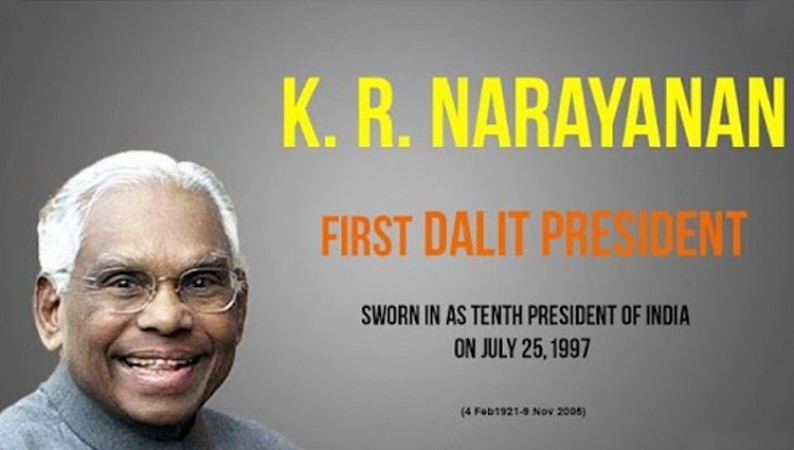
THIS DAY IN HISTORY: On July 25, 1997, a momentous chapter in India's history was scripted when Kocheril Raman Narayanan, fondly known as K.R. Narayanan, took the oath as the Tenth President of the Republic of India. His inauguration marked not only a personal triumph but also a significant milestone for India's political landscape. Born into humble beginnings, Narayanan's rise to the nation's highest office is a testament to his unwavering dedication, intellectual prowess, and commitment to public service.
Early Life and Career: K.R. Narayanan was born on October 27, 1920, in Uzhavoor, a small village in the southern Indian state of Kerala. Raised in an economically disadvantaged family, Narayanan faced numerous hardships during his early years. However, his determination to pursue education led him to excel academically, eventually securing a scholarship to study at the University of Travancore.
Narayanan's academic brilliance paved the way for a successful career in the Indian Foreign Service (IFS). He represented India in various diplomatic roles across different nations, earning respect and accolades for his intellect and diplomatic acumen. His exceptional grasp of international relations and diplomacy significantly contributed to India's global standing during his tenure as a diplomat.
Political Journey: Although Narayanan's contributions to India's foreign policy were well-regarded, it was his transition to domestic politics that would etch his name in the annals of Indian history. In 1984, he was appointed as India's Vice-President, serving under President R. Venkataraman. Narayanan's tenure as Vice-President was marked by a steadfast commitment to upholding the values of the Indian Constitution and fostering unity and harmony among the diverse populace of the nation.
Presidential Candidacy and Election: As his term as Vice-President concluded, K.R. Narayanan emerged as a prominent candidate for the presidential elections in 1997. His nomination garnered bipartisan support, with political leaders from various parties acknowledging his intellect, integrity, and inclusive approach. Narayanan's reputation as a scholar, thinker, and statesman transcended political divides, making him a consensus choice for the presidency.
On July 15, 1997, the electoral college, comprising members of both houses of Parliament and state legislatures, overwhelmingly elected Narayanan as the Tenth President of India. His election to the esteemed office was a moment of pride for the entire nation, as he became the first Dalit (formerly known as "Untouchables") to occupy the highest position in the Indian political hierarchy.
Presidency and Legacy: Narayanan's presidency was marked by a steadfast commitment to democracy, secularism, and social justice. He diligently upheld the principles enshrined in the Indian Constitution and fiercely protected the unity and diversity of the nation. Throughout his term, he demonstrated a keen interest in the welfare of the marginalized and underprivileged sections of society.
As an advocate of inclusivity, Narayanan actively engaged with civil society and encouraged open dialogues on critical social issues. His speeches were characterized by profound intellect and wisdom, inspiring the citizens to work collectively for a prosperous and harmonious India.
Retirement and Post-Presidential Life: After completing his term as President in 2002, K.R. Narayanan retired from active politics. However, his commitment to public service continued unabated. He remained an influential voice on various matters of national importance and actively participated in public discussions on policy and governance.
K.R. Narayanan's presidency remains etched in the collective memory of India as a period characterized by statesmanship, integrity, and the pursuit of social justice. His life journey from a modest village in Kerala to the Rashtrapati Bhavan, the official residence of the President, is a testament to the potential of human perseverance and the power of intellect.
Narayanan's legacy continues to inspire generations of Indians to aspire to positions of leadership while remaining firmly grounded in their values and principles. As the Tenth President of India, he left an indelible mark on the nation's political landscape, reinforcing the idea that true greatness lies in serving the people and working towards the collective betterment of society.